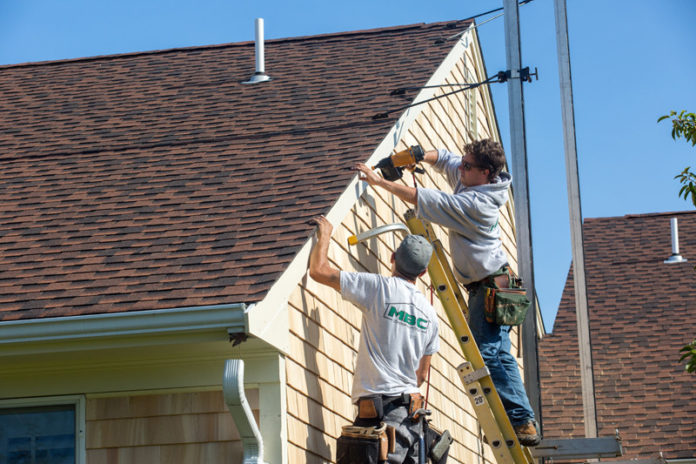
The Cosmopolitan condominium at 100 Fountain St. at the corner of Mathewson Street in Providence has made improvements to its parking lot to provide added security and convenience, funded by a bank loan to the condo association.
“We owned a parking lot, but it wasn’t adjacent to the building and we wanted to purchase an additional, adjacent lot from The Providence Journal,” said Sean Marchionte, a resident of The Cosmopolitan and a board member of the condominium association. “We felt that it was an amenity for the building and would add value to the units,” he said.
While not as robust as some other areas of commercial lending, condo associations have been showing signs of rebounding along with the general economy, say some local bankers.
“As the real estate market has rebounded in the last [few] years, so has the health and financial condition of most condominium associations, so associations’ interest in bank loans has increased,” said Paul J. DiSanto, vice president and commercial loan officer for BankNewport.
“Many associations were not in good financial condition four to six years ago and now they are facing deferred-maintenance issues, which will lead to a demand for bank loans in the next several years,” he said.
BankNewport has been providing loans to condominium associations for about five years, said DiSanto, including to the Oakland Farm Condominium Association in Portsmouth, for a recent shingle renovation project.
The work at Cosmopolitan has been completed and has a fence, an improved driveway and the advantage of additional parking adjacent the building, which is a plus in a downtown residence, he said.
“Now it connects – we completed the missing piece,” said Marchionte.
As a principal in Blue Dog Capital Partners, Marchionte offered his expertise to assist The Cosmopolitan Homeowners Association in determining the most advantageous way to fund the transaction.
The Cosmopolitan has 14 units, 12 of them residential and two commercial, so instead of requiring the relatively small number of owners at the boutique condo to come up with a significant amount of cash for the project, the association turned to Webster Bank.
“I found it to be effective to attend community meetings to guide the volunteer leadership board and the community association to develop a comprehensive financing plan that would meet their needs and secure the necessary unit-owner approvals,” said Singh.
“With these types of loans, it is the association – not the unit owner – that is borrowing the money and providing security,” said Singh. “As such, the unit owners are not signing any loan documents or mortgaging their own condominium units.”
Webster Bank’s overall strategy includes a focus on this niche market of association lending, said Singh.
Webster Bank is based in Waterbury, Conn., and its footprint covers Connecticut, Massachusetts, Rhode Island and Westchester County, N.Y.
The bank has expanded its offerings to this niche market with its Homeowner Association Plus Program.
“We offer discounts on personal mortgages and home-equity lines of credit for unit owners if the association chooses to bank with Webster,” said Singh. “It’s another way of cross-selling.”
Webster Bank launched its association lending in 2005 and continued to build that market segment.
“These are profitable loans to the bank,” he said. “We’re very prudent in our underwriting practices and the default rate with these loans is very low.
“A lot of these are capital-intensive projects and the funding has to come from dipping into the association’s reserves or the board can do a one-time assessment, or the association can get a bank loan,” said Singh.
“It’s an active market and I’ve been especially busy for the last four months. The improvements are typically common-area repairs, like a roof or parking lots,” he said. “This is the time when condo associations have an opportunity to make improvements, before winter.”
Providence-based Olympus Group, a full-service property-management firm that specializes in commercial and condominium management, works with condo associations considering a project to determine if an association loan is good choice.
Association lending is a relatively new offering from banks, he said.
“Before the financial meltdown in 2008, it wasn’t even on anybody’s radar, especially in Rhode Island,” said Webb. “If a condo association was talking about a project, they just weren’t able to get bank financing, because the loan would be to all the individual unit owners.
The condominium that did the roof project, which Webb declined to identify, was done with an association loan from Webster Bank.
“The owners in that association had been babysitting that roof for four years, wondering how they would afford it,” said Webb.
“Webster Bank has the sophistication to underwrite the various risks and the bank understands the nuances of having the association stand in lieu of the owners,” said Webb.
“We’re thrilled that banks are doing these loans,” he said. “It’s definitely made it easier to manage a condominium if you can tap a loan for a project and spread it out, sometimes up to 10 years.”
Savings Institute Bank & Trust President and CEO Rheo Brouillard said the Willimantic, Conn.-based bank has been doing association lending for about 10 years. The bank acquired NewportFed in 2013.
“We have someone on our staff who specializes in association lending, so that gives us the expertise on how the programs work and how to go about marketing it with condo associations and property managers,” said Brouillard.
“Our specialist goes in and makes a presentation to the condo-association board and they have to go through a process of voting on it,” he said. The loans are generally for work on projects like roofs, windows, painting or driveways.
“I would say it’s competitive. When we’re in there working with a property manager or condo association, we’re not usually the only ones in there,” said Brouillard.
“I think these condos are maturing and it’s getting to a point where it’s time to make improvements to their facilities,” he said. •












